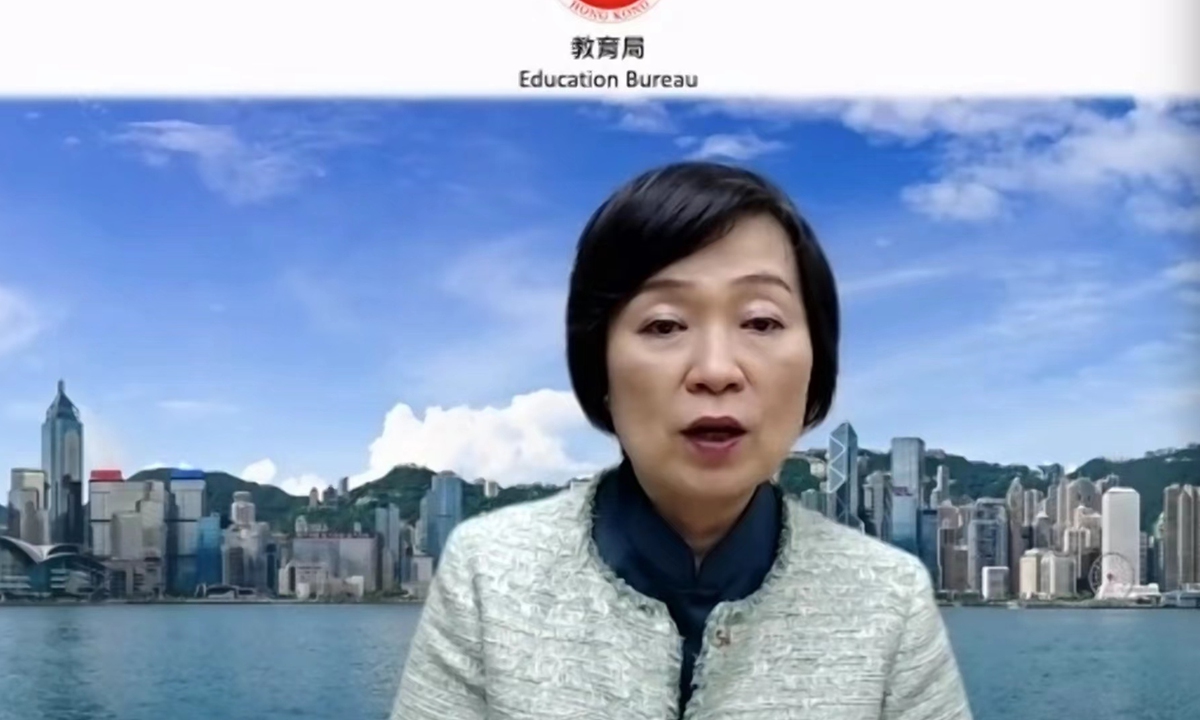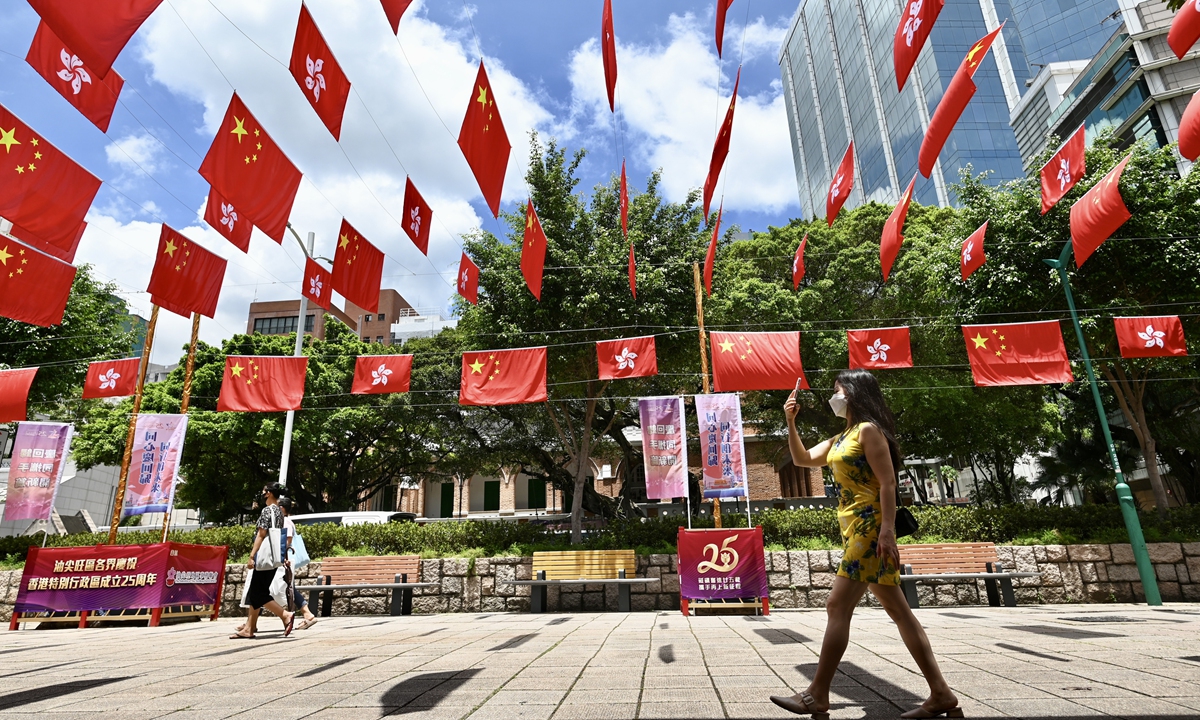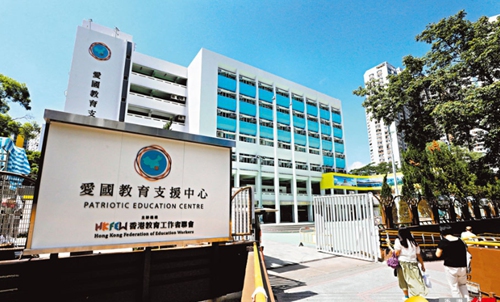Exclusive: School education in Putonghua necessary in HK, to be realized when conditions are met: HK Education Secretary

Choi Yuk-lin, secretary for education of the Hong Kong Special Administrative Region, talks with the Global Times via video link. Photo: Chen Qingqing/GT
Advancing the school education in Putonghua is very important as the Hong Kong youth would be in a disadvantageous position if they can't speak Putonghua, the common language used nationwide in China, and if some conditions can be met, local schools in Hong Kong should offer education in Putonghua, Christine Choi Yuk-lin, secretary for education of the Hong Kong Special Administrative Region, told the Global Times in an exclusive interview.
Currently, the Chinese Language Subject is taught in both Putonghua and Cantonese - the dialect in Hong Kong and South China's Guangdong Province. Choi told the Global Times that if the young generation in Hong Kong can't speak Putonghua, they would suffer losses as the country's rapid development, especially the Greater Bay Area development, will offer more opportunities, so the schools must teach them Putonghua.
"In the future, if teachers meet requirements and schools offer the environment for learning language, as well as students are capable of understanding it, using Putonghua in local education will be a more convenient way," she said.
Hong Kong's education sector has seen a number of positive changes over the past few years since the implementation of the national security law for Hong Kong and the electoral reform, which helped bring back the social order and fix the loopholes in local governance. The social turmoil in 2019 underscored the necessity of enhancing the national security awareness among Hong Kong youth and of correcting some misconceptions and misunderstandings about the country, the "one country, two systems" and some other important ideas.
During the unprecedented social turmoil in 2019, some student unions from local universities played a negative role in instigating the anti-China sentiment and hatred toward the Chinese people, and some rioters used universities as their sanctuary to engage in illegal activities that endangered national security.
Universities have rolled out measures in accordance with the national security law, and in the future, we'll continue emphasizing that universities are not the places outside the law and students must respect the rule of law and be responsible for their actions, Choi said, noting that currently, students' activities in universities have been back on the right track.
Besides enhancing the national security education on school campuses, the Education Bureau aims to strengthen the education on the Constitution, the Basic Law and correct values, and the official believes that by participating in those activities, students won't be easily misguided to do wrong things.
The University of Hong Kong has changed its graduation requirements, demanding students to take a course related to the national security law for Hong Kong before graduating, local media reported on Monday. And several other universities including the Hong Kong Baptist University and the Hong Kong Polytechnic University have also made such arrangements.
Another major move in fixing the loopholes in the education sector was introducing officially approved textbooks applicable to the subject of Citizenship and Social Development (Citizenship) recently. The predecessor of Citizenship, Liberal Studies had existed in Hong Kong for a long time, and was criticized for not having the review mechanism on its teaching materials. Many had found content in Liberal Studies that incited hatred among citizens and vilified the government, and some teachers even directly imparted students their poisonous political views in the classroom.
"Now we have included the textbooks for the subject of Citizenship into our textbook review system, and the authority gives a clear guidance for publishers on the content development, correcting some issues found during the process," Choi said.
"Hong Kong has never been a colony of Britain" mentioned in the new textbook attracted attention recently. Observers said the content set the right understanding of the region and corrected some long-held flawed thinking in the city's education system.
During the review process, we invited professionals to help set some important concepts correct, such as legal experts on the Basic Law, Choi noted. As for students in basic education, understanding the correct concepts is very important, otherwise, it would be very dangerous, she said. "For example, some partially understood the 'one country, two systems' by interpreting it as 'two systems' should confront with 'one country,' which is dangerous."
From now on, the wrong concepts won't exist in local education, and the future basic education should help students set up correct values first, the official noted.

China's national flag and the flag of Hong Kong Special Administrative Region hanging over the streets in Hong Kong on June 17, 2022 Photo: VCG
As a mandatory part of the subject of Citizenship, students in Hong Kong high schools must take the study tours in the mainland to increase their understanding about the country's development. The Education Bureau also provided 21 itineraries and most of them are in the Greater Bay Area.
"It's part of important measures to learn about our country from a comprehensive way … Every year, there will be hundreds and thousands of local students to take this trip, and hopefully, the borders between the city and the mainland will reopen soon to launch the trip," Choi said.
In June, foreign English-language teachers were requested to swear allegiance to the Basic Law, which some experts considered was part of the Hong Kong government's education revamp plan. Choi believes that technically, foreign English teachers are part of the civil servant group, no matter what his or her nationality is, their work serves the public, and all government staff are required to declare that they will uphold the Basic Law, bear allegiance to the HKSAR, be dedicated to their duty, and be responsible to the HKSAR government.
Local media in Hong Kong earlier reported that about 40 percent of the rioters and illegal protesters arrested during the social turmoil in 2019 were students, and some questions were raised about whether the local government will pardon those young suspects who have been put in jail.
"If they violate the law, of course, they need to bear the legal responsibility," Choi said, noting that still, we should consider that the youth are an important part of building the future society.
If those young people truly repent and correct their deeds, some law enforcement authorities could take an evaluation on that to see if there are opportunities for them to restart their study or career to help build a better Hong Kong, the official said.



